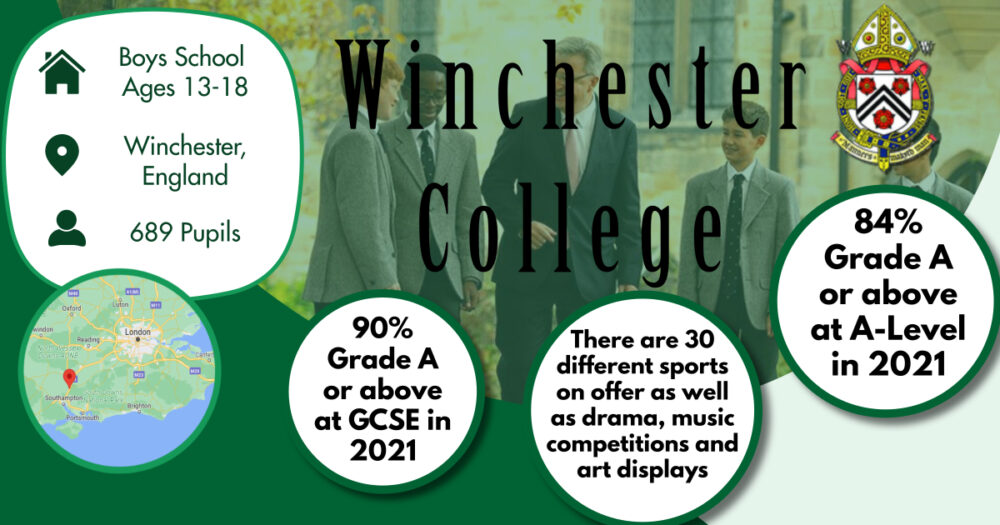
The language of the school
Winchester is quirky and has its own vocabulary known as ‘notions’. Most of the notions which are still in use relate to school-specific activities, but some are more generic, e.g. ‘goive’ which is roughly the equivalent of ‘whatever’!
The Curriculum
The boys study IGCSE courses in the lower school and A levels in the sixth form.
Division: Winchester’s unique liberal studies course runs throughout the school. In the lower years, boys explore a range of areas including history, using the Winchester archive and Warden’s Stables museum; art, participating in the Kenneth Clarke prize; and exploring philosophical and literary ideas. In the sixth form, boys explore philosophy, economics, history of art, music… anything which might inspire them!
Brandon’s view
For bright, inquisitive boys, Winchester is hard to beat. The Medieval campus is beautiful, and the teaching is truly inspiring. There are 30 different sports on offer in addition to houses and school drama, house music competitions, art displays and talks from visiting dignitaries; something for everyone!
Entry at 13+
Winchester College is a popular school that many students apply for at 13+. The admissions process has multiple stages featuring the ISEB Pre-Test, an academic interview and exams taken in Year 8.
Stage 1:
Stage 2:
Take the ISEB Pre-Test in the Autumn of Year 6. This will feature multiple-choice English, Maths, Verbal and Non-Verbal Reasoning questions. The entire ISEB Pre-Test is computerised and is adaptive.
Stage 3:
Successful students are invited to an academic interview which will feature many of the classic features of an interview as well as some unseen material such as mathematical and non-verbal reasoning questions.
Stage 4:
In the Spring of Year 8, students take either the commoner or election papers. Papers include English, Maths, Science, Humanities and Languages as well as General Papers. This is the final stage of the admissions process.
* All information from https://www.winchestercollege.org/admissions/13
Recommended Classes
ISEB Pre-Test
Classes covering English, Maths, Verbal and Non-Verbal questions alongside exam-technique.
Interview Preparation
Learning to respond to unseen material as well as discussing traditional interview questions. Every Christmas we offer specialised Winchester Interview Preparation courses.
Academic Studies
Classes in English, Maths and Science are highly recommended for 13+ entry alongside lessons in humanities and languages such as Latin or French.
What is Winchester Looking For?
Winchester is looking for boys who will excel in all areas. From the ISEB Pre-Test to the interview and beyond, Winchester looks for boys who stand out from the crowd and make an impression. As they will be starting school in Year 9, students will be expected to have a good knowledge of a wide range of subjects, hence why so many subjects are tested in the entrance exams.
Students should not be afraid to express themselves and are encouraged to learn from the past in order to adapt.
Winchester College- Admissions and Interviews
This post is part of an occasional series based on meetings with Winchester College registrars.
Brandon recently had a visit from Mr Andrew Shedden, Registrar of Winchester College.
To summarise some of Mr Shedden’s points:
Who thrives at Winchester?
Academically curious, engaged boys who are willing to think beyond the classroom.
How does the school identify suitable students?
The first stage is the ISEB common pre-test (CPT). Should your son do well in the pre-test, he will be invited to an interview during which he may be given a verbal, non-verbal and logic test and school reference will be requested.
What is a Winchester interview like?
Unexpected! The purpose of the interview is to try to see what makes the boys ‘tick’.
Wise words?
Boys need to be guided to develop resilience and independence. They should be willing to take risks and to learn how to cope with failure.
We at Brandon share this philosophy: we will all fail at some point in our lives, and it is how we pick ourselves up that makes a difference. There is a school for every child and, wherever your son or daughter goes to, hopefully their early training will lead them on the path to success.
Case Study: Studying at Winchester
This is an interview with P, who joined Brandon Learning Centre at the age of 9 and which won a place at Winchester.
What was the big difference between lessons at Wincoll and your HK local school?
I felt that I was definitely more motivated by my teachers at Winchester to explore more about the topics I was interested in outside of the classroom. While the idea of researching myself seemed a bit daunting, being a boarding student meant that I had access to the tutors who supervised my house every night. These tutors were actual teachers, and it was very convenient to be able to ask them about my homework or something which I was curious about. The classes at Winchester were also more discussion-driven ( similar to university), meaning I was encouraged to ask questions and share my thoughts in class. Listening to my peers not only allowed me to learn more, but also made class less mundane.
What advice would you give to someone boarding for the first time?
Don’t be afraid to step out of your comfort zone. Being in Winchester gave me the opportunity to try so many new activities which I didn’t know I liked, such as cross-country running, tennis, and athletics. The sooner you are willing to take that first step, the less time it will take for you to discover what you truly love doing.
Was there anything surprising about studying in the UK?
So many things. The food took me sometime to get used to. British slang was very confusing at first. I also had a lot more freedom in terms of what I can do during my free time.
Did your UK studies prepare you for the US?
I think being in boarding school in the UK made me more confident when meeting new people, and taught me how to better interact with others around you. I was also more far more outgoing and sociable that I was before studying at Winchester, because I was already comfortable with the idea of stepping out of my comfort zone and exploring new things.

